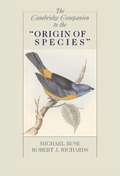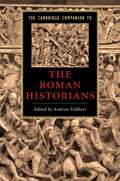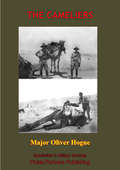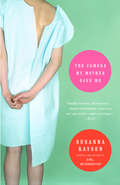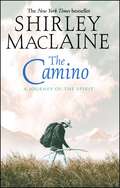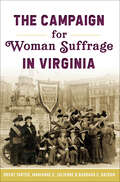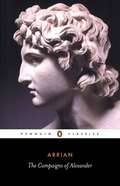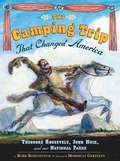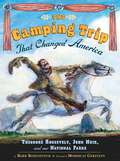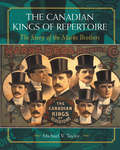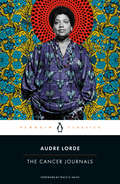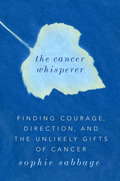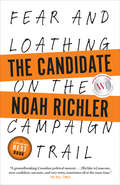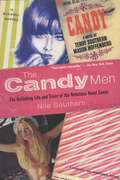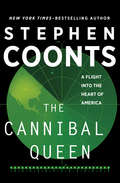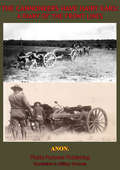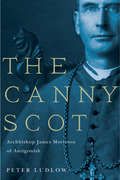- Table View
- List View
The Cambridge Companion to the "Origin of Species"
by Robert J. Richards Michael RuseThe Origin of Species by Charles Darwin is universally recognised as one of the most important science books ever written. The Origin of Species is also a work of great cultural and religious significance, in that Darwin maintained that all organisms, including humans, are part of a natural process of growth from simple forms. This Companion commemorates the 150th anniversary of the publication of the Origin of Species and examines its main arguments. Drawing on the expertise of leading authorities in the field, it also provides the contexts - religious, social, political, literary, and philosophical - in which the Origin was composed. Written in a clear and friendly yet authoritative manner, this volume will be essential reading for both scholars and students More broadly, it will appeal to general readers who want to learn more about one of the most important and controversial books of modern times.
The Cambridge Companion to the Actress
by Maggie B. Gale John StokesThis Companion brings together sixteen new essays which examine, from various perspectives, the social and cultural role of the actress throughout history and across continents. Each essay focuses on a particular stage in her development, for example professionalism in the seventeenth century; the emergence of the actress/critic during the Romantic period and, later on, of the actress as best selling autobiographer; the coming of the drama schools which led to today's emphasis on the actress as a highly-trained working woman. Chapters consider the image of the actress as a courtesan, as a 'muse', as a representative of the 'ordinary' housewife, and as a political activist. The collection also contains essays on forms, genres and traditions - on cross dressing, solo performance, racial constraints, and recent Shakespeare - as well as on the actress in early photography and on film. Its unique range will fascinate, surprise and instruct theatre-goers and students alike.
The Cambridge Companion to the Age of Attila
by Michael MaasThis book examines the age of Attila, roughly the fifth century CE, an era in which western Eurasia experienced significant geopolitical and cultural changes. The Roman Empire collapsed in western Europe, replaced by new 'barbarian' kingdoms, but it continued in Christian Byzantine guise in the eastern Mediterranean. New states and peoples changed the face of northern Europe, while in Iran, the Sasanian Empire developed new theories of power and government. At the same time, the great Eurasian steppe became a permanent presence in the European world. This book treats Attila, the notorious king of the Huns, as both an agent of change and a symbol of the wreck of the old world order.
The Cambridge Companion to the Roman Historians
by Andrew FeldherrNo field of Latin literature has been more transformed over the last couple of decades than that of the Roman historians. Narratology, a new receptiveness to intertextuality, and a re-thinking of the relationship between literature and its political contexts have ensured that the works of historians such as Livy, Sallust, and Tacitus will be read as texts with the same interest and sophistication as they are used as sources. In this 2009 book, topics central to the entire tradition, such as conceptions of time, characterization, and depictions of politics and the gods, are treated synoptically, while other essays highlight the works of less familiar historians, such as Curtius Rufus and Ammianus Marcellinus. A final section focuses on the rich reception history of Roman historiography, from the ancient Greek historians of Rome to the twentieth century. An appendix offers a chronological list of the ancient historians of Rome.
The Cambridge Encyclopedia of Darwin and Evolutionary Thought
by Michael RuseThis volume is a comprehensive reference work on the life, labors, and influence of the great evolutionist Charles Darwin. With more than sixty essays written by an international group representing the leading scholars in the field, this is the definitive work on Darwin. It covers the background to Darwin's discovery of the theory of evolution through natural selection, the work he produced and his contemporaries' reactions to it, and evaluates his influence on science in the 150 years since the publication of Origin of Species. It also explores the implications of Darwin's discoveries in religion, politics, gender, literature, culture, philosophy, and medicine, critically evaluating Darwin's legacy. Fully illustrated and clearly written, it is suitable for scholars and students as well as the general reader. The wealth of information it provides about the history of evolutionary thought makes it a crucial resource for understanding the controversies that surround evolution today.
The Cambridge Encyclopedia of Stage Actors and Acting
by Simon WilliamsActing is widely acknowledged to be the central art of the theatre and has a long and vibrant history. With over 1,000 entries, this is the first encyclopedia of stage actors and acting around the world. More than 100 renowned international contributors provide biographical, historical and technical information about actors both familiar and obscure whose work has been crucial in the development of acting methods and traditions from classical theatre to the present day. Entries on key directors, theorists and teachers and on the elements and genres of acting provide insights into the history of acting as an art and its current practice. Including a chronological list of actors that spans the past 2,000 years and many diverse countries and cultures, this Encyclopedia offers a fascinating and unique overview of acting onstage that will be of interest to anyone who attends or practises theatre.
The Cambridge History of Capitalism: From Ancient Origins to 1848
by Jeffrey G. Williamson Larry NealThe first volume of The Cambridge History of Capitalism provides a comprehensive account of the evolution of capitalism from its earliest beginnings. Starting with its distant origins in ancient Babylon, successive chapters trace progression up to the 'Promised Land' of capitalism in America. Adopting a wide geographical coverage and comparative perspective, the international team of authors discuss the contributions of Greek, Roman and Asian civilizations to the development of capitalism, as well as the Chinese, Indian and Arab empires. They determine what features of modern capitalism were present at each time and place, and why the various precursors of capitalism did not survive. Looking at the eventual success of medieval Europe and the examples of city-states in northern Italy and the Low Countries, the authors address how British mercantilism led to European imitations and American successes, and ultimately, how capitalism became global.
The Cambridge Wagner Encyclopedia
by Nicholas VazsonyiRichard Wagner is one of the most controversial figures in Western cultural history. He revolutionized not only opera but the very concept of art, and his works and ideas have had an immeasurable impact on both the cultural and political landscapes of the late nineteenth and twentieth centuries. From "absolute music" to "Zurich" and from "Theodor Adorno" to "Hermann Zumpe," the vividly-written entries of The Cambridge Wagner Encyclopedia have been contributed by recognized authorities and cover a comprehensive range of topics. More than eighty scholars from around the world, representing disciplines from history and philosophy to film studies and medicine, provide fascinating insights into Wagner's life, career, and influence. Multiple appendices include listings of Wagner's works, historic productions, recordings, and addresses where he lived, to round out a volume that will be an essential and reliable resource for enthusiasts and academics alike.
The Cameliers
by Major Oliver Hogue"Oliver Hogue (1880-1919), journalist and soldier, was born on 29 April 1880 in Sydney ...He enlisted in the Australian Imperial Force in Sep. 1914 as a trooper with the 6th Light Horse Regiment. Commissioned second lieutenant in Nov., he sailed for Egypt with the 2nd L.H. Brigade in the Suevic in Dec..Hogue served on Gallipoli with the Light Horse (dismounted) for five months, then was invalided to England with enteric fever. In May 1915 he was promoted lieutenant and appointed orderly officer to Colonel Ryrie, the brigade commander. As 'Trooper Bluegum' he wrote articles for the Herald subsequently collected in the books Love Letters of an Anzac and Trooper Bluegum at the Dardanelles. Sometimes representing war as almost a sport, he took pride in seeing 'the way our young Australians played the game of war'.Hogue returned from hospital in England to the 6th L.H. in Sinai and fought in the decisive battle of Romani. Transferred to the Imperial Camel Corps on 1 Nov. 1916, he was promoted captain on 3 July 1917. He fought with the Camel Corps at Magdhaba, Rafa, Gaza, Tel el Khuweilfe, Musallabeh, and was with them in the first trans-Jordan raid to Amman. In 1917 Hogue led the 'Pilgrim's Patrol' of fifty Cameliers and two machine-guns into the Sinai desert to Jebel Mousa, to collect Turkish rifles from the thousands of Bedouins in the desert.After the summer of 1918, spent in the Jordan Valley, camels were no longer required. The Cameliers were given horses and swords and converted into cavalry. Hogue, promoted major on 1 July 1918, was now in Brigadier General George Macarthur-Onslow's 5th L.H. Brigade, commanding a squadron of the 14th L.H. Regiment. At the taking of Damascus by the Desert Mounted Corps in Sep. 1918, the 5th Brigade stopped the Turkish Army escaping through the Barada Gorge. As well as the articles sent to Australia, and some in English magazines, Hogue wrote a third book, The Cameliers,..."-Aust. Dict. of Nat. Bio.
The Camera My Mother Gave Me
by Susanna KaysenThe Camera My Mother Gave Metakes us through Susanna Kaysen’s often comic, sometimes surreal encounters with all kinds of doctors—internists, gynecologists, “alternative health” experts—as well as with her boyfriend and her friends, when suddenly, inexplicably, “something went wrong” with her vagina. The title comes from Luis Buñuel’s filmViridiana. Some peasants are at a banquet in a country mansion. They ask a maid to take a group snapshot, and she obliges, lifting up her skirt and using the “camera” that’s underneath. Kaysen’sThe Camera My Mother Gave Meobserves what happens when sexual pleasure is replaced by pain. “When eros goes away,” she writes, “it’s as if I’m colorblind. The world is gray. ” But is this a problem of body, or mind? And can clinicians tease out the difference between the two? Spare, frank, and altogether original,The Camera My Mother Gave Mechallenges us to think in new ways about the centrality and power of sexuality. It is an extraordinary investigation into the role sex plays in perception and our notions of ourselves—and into what happens when the erotic impulse meets the world of medicine
The Camino
by Shirley MaclaineIt has been nearly three decades since Shirley MacLaine commenced her brave and public commitment to chronicling her personal quest for spiritual understanding. In testament to the endurance and vitality of her message, each of her eight legendary bestsellers -- fromDon't Fall Off the MountaintoMy Lucky Stars-- continues today to attract, dazzle, and transform countless new readers. Now Shirley is back -- with her most breathtakingly powerful and unique book yet. This is the story of a journey. It is the eagerly anticipated and altogether startling culmination of Shirley MacLaine's extraordinary -- and ultimately rewarding -- road through life. The riveting odyssey began with a pair of anonymous handwritten letters imploring Shirley to make a difficult pilgrimage along the Santiago de Compostela Camino in Spain. Throughout history, countless illustrious pilgrims from all over Europe have taken up the trail. It is an ancient -- and allegedly enchanted -- pilgrimage. People from St. Francis of Assisi and Charlemagne to Ferdinand and Isabella to Dante and Chaucer have taken the journey, which comprises a nearly 500-mile trek across highways, mountains and valleys, cities and towns, and fields. Now it would be Shirley's turn. For Shirley, the Camino was both an intense spiritual and physical challenge. A woman in her sixth decade completing such a grueling trip on foot in thirty days at twenty miles per day was nothing short of remarkable. But even more astounding was the route she took spiritually: back thousands of years, through past lives to the very origin of the universe. Immensely gifted with intelligence, curiosity, warmth, and a profound openness to people and places outside her own experience, Shirley MacLaine is truly an American treasure. And once again, she brings her inimitable qualities of mind and heart to her writing. Balancing and negotiating the revelations inspired by the mysterious energy of the Camino, she endured her exhausting journey to Compostela until it gradually gave way to a far more universal voyage: that of the soul. Through a range of astonishing and liberating visions and revelations, Shirley saw into the meaning of the cosmos, including the secrets of the ancient civilizations of Atlantis and Lemuria, insights into human genesis, the essence of gender and sexuality, and the true path to higher love. With rich insight, humility, and her trademark grace, Shirley MacLaine gently leads us on a sacred adventure toward an inexpressibly transcendent climax. The Caminopromises readers the journey of a thousand lifetimes.
The Campaign for Women Suffrage in Virginia (American Heritage)
by Brent Tarter Marianne E. Julienne Barbara C. BatsonIn 1920, Virginia's General Assembly refused to ratify the Nineteenth Amendment to the United States Constitution to grant women the vote. Virginia's suffragists lost. Or did they? When the thirty-sixth state ratified the amendment, women gained voting rights across the nation. Virginia suffragists were a part of that victory, although their role has been nearly forgotten. They marched in parades, rallied at the state capitol, spoke to crowds on street corners, staffed booths at fairs, lobbied legislators, picketed the White House and even went to jail. The Campaign for Woman Suffrage in Virginia reveals how women created two statewide organizations to win the right to vote. At the centenary of the movement, these remarkable women can at last be recognized for their important contributions.
The Campaigns of Alexander
by ArrianThe most important historical source on one of the most powerful leaders of the ancient world, Arrian's The Campaigns of Alexander illustrates how Alexander the Great came to rule over a vast empire of his own making, translated from the Greej by Aubrey de Sélincourt, and revised with an introduction and notes by J.R. Hamilton in Penguin Classics. <p><p> Although written over four hundred years after Alexander's death, Arrian's Campaigns of Alexander is the most reliable account of the man and his achievements we have. Arrian's own experience as a military commander gave him unique insights into the life of the world's greatest conqueror. He tells of Alexander's violent suppression of the Theban rebellion, his total defeat of Persia and his campaigns through Egypt, India and Babylon—establishing new cities and destroying others in his path. While Alexander emerges from this record as an unparalleled and charismatic leader, Arrian succeeds brilliantly in creating an objective and fully-rounded portrait of a man of boundless ambition, who was exposed to the temptations of power and was worshipped as a god in his own lifetime <p><p> Aubrey de Sélincourt's vivid translation is accompanied by J.R. Hamilton's introduction, which discusses Arrian's life and times, his synthesis of other classical sources and the composition of Alexander's army. This edition also contains appendices, maps, a list for further reading and a detailed index. <p><p> The details of Arrian's life (b. 86) are uncertain, though the shape of it indicates a man of wide and varied talents. He was governor to the Emperor Hadrian, the author of a number of works of non-fiction and an Athenian citizen. In 145 he rose to become a chief magistrate of Athens and thereby part of the governing body of the city. His date of death is not known. <p><p> If you enjoyed The Campaigns of Alexander, you might like Thucydides' History of the Peloponnesian War, also available in Penguin Classics.
The Campaigns of Alexander
by Aubrey De Selincourt'His passion was for glory only, and in that he was insatiable' Although written over four hundred years after Alexander's death, Arrian's Campaigns of Alexander is the most reliable account of the man and his achievements we have.
The Camping Trip That Changed America: Theodore Roosevelt, John Muir, and Our National Parks (Into Reading, Read Aloud Module 7 #2)
by Mordicai Gerstein Barb RosenstockNIMAC-sourced textbook
The Camping Trip that Changed America
by Barbara Rosenstock Mordecai GersteinCaldecott medalist Mordicai Gerstein captures the majestic redwoods of Yosemite in this little-known but important story from our nation's history. In 1903, President Theodore Roosevelt joined naturalist John Muir on a trip to Yosemite. Camping by themselves in the uncharted woods, the two men saw sights and held discussions that would ultimately lead to the establishment of our National Parks.
The Camping Trip that Changed America: Theodore Roosevelt, John Muir, and Our National Parks
by Barb RosenstockCaldecott medalist Mordicai Gerstein captures the majestic redwoods of Yosemite in this little-known but important story from our nation's history. In 1903, President Theodore Roosevelt joined naturalist John Muir on a trip to Yosemite. Camping by themselves in the uncharted woods, the two men saw sights and held discussions that would ultimately lead to the establishment of our National Parks.
The Canadian Kings of Repertoire: The Story of the Marks Brothers
by Michael V. TaylorThe Marks Brothers may well have been the most remarkable theatrical family in Canadian history. A phenomenon on the vaudeville circuit, the seven brothers left the farm and took to the boards and the footlights throughout the latter part of the 19th century and into the 1920s. The brothers from Christie Lake, near Perth in Eastern Ontario, played to an estimated eight million Canadians, as well as to sizeable audiences in the United States. Their road shows, largely melodramas and comedy, kept audiences crying, booing, laughing and cheering until movies sounded the death knell for touring repertory companies. The publication of The Canadian Kings of Repertoire brings back for one more curtain call the seven Marks boys, top hats, diamond rings and all. Joining them in a farewell performance are their glamorous leading ladies and a superb cast of supporting players. So clear the aisles and up with the curtain. It’s showtime once more.
The Cancer Journals: Special Edition
by Audre LordeMoving between journal entry, memoir, and exposition, Audre Lorde fuses the personal and political as she reflects on her experience coping with breast cancer and a radical mastectomy.A Penguin ClassicFirst published over forty years ago, The Cancer Journals is a startling, powerful account of Audre Lorde's experience with breast cancer and mastectomy. Long before narratives explored the silences around illness and women's pain, Lorde questioned the rules of conformity for women's body images and supported the need to confront physical loss not hidden by prosthesis. Living as a "black, lesbian, mother, warrior, poet," Lorde heals and re-envisions herself on her own terms and offers her voice, grief, resistance, and courage to those dealing with their own diagnosis. Poetic and profoundly feminist, Lorde's testament gives visibility and strength to women with cancer to define themselves, and to transform their silence into language and action.
The Cancer Whisperer: Finding Courage, Direction, and The Unlikely Gifts of Cancer
by Sophie SabbageThe self-published sensation and UK bestseller that has helped thousands touched by cancer. “I have cancer. Cancer does not have me.” Sophie Sabbage was forty-eight years old, happily married, and mother to a four-year-old daughter when she was diagnosed with late-stage lung cancer. Since that shocking diagnosis, she has been on a remarkable journey of healing and renewal that has reshaped her life—for the better. The Cancer Whisperer chronicles Sophie’s extraordinary relationship with cancer and the very effective methods she has used for dealing with her fear, anger, denial, and grief. The Brené Brown of cancer, Sophie empowers readers to reject the traditional adversarial relationship with cancer by teaching us how to listen to it; how to be healed by it as well as how to seek to cure it; and how to be emotionally free even when we are physically curtailed. Beautifully and poignantly written, The Cancer Whisperer encourages cancer patients to: • Direct their own treatment while preserving their personhood in a system that tends to see them as patients more than people. • Engage with fear, anger, and grief in healthy and healing ways instead of toughing it out, trying to be falsely positive, or collapsing into despair. • Radically shift from being a cancer victim to a cancer listener—fostering an understanding of cancer as a symptom of other underlying causes and engaging with whatever changes it calls on them to make. As authentic as it is revolutionary, The Cancer Whisperer calls for an end to “the war on cancer” and the start of a more transformative dialogue with the disease.
The Candidate: Fear and Loathing on the Campaign Trail
by Noah RichlerA comical and revealing account of what it's like to run for office with no political experience, little money and only a faint hope of winning, told first-hand by celebrated writer Noah Richler.During the 2015 federal election, approximately 1200 political campaigns were held across Canada. One of those campaigns belonged to author, journalist and political neophyte Noah Richler. Recruited by the NDP to run in the bellwether riding of Toronto-St Paul's, he was handed $350 and told he would lose. But as veteran NDP activists and social-media-savvy newbies joined his campaign, Richler found himself increasingly insulated from the stark reality that his campaign was flailing, imagining instead that he was headed to Parliament Hill. In The Candidate, Richler recounts his time on the trail in sizzling detail and hilarious frankness, from door knocking in Little Jamaica to being internet-shamed by experienced opponents. The Candidate lays bare what goes on behind the slogans, canvassing and talking points, told from the perspective of a political outsider. With his signature wit and probing eye, Noah Richler's chronicle of running for office is insightful, brutally honest and devastatingly funny.
The Candy Men: The Rollicking Life and Times of the Notorious Novel Candy
by Nile SouthernThis unbelievable, “thoroughly enjoyable” story shocked the censors and (of course) went on to worldwide notoriety (The New York Times). In the early fall of 1958, the already-notorious Olympia Press in Paris published a novel entitled Candy—an erotic, Rabelaisian satire loosely based on Voltaire’s Candide written by Terry Southern and Mason Hoffenberg under the pseudonym Maxwell Kenton. The novel was banned by French censors, reissued by Olympia’s intrepid publisher under the title Lollipop, re-banned, and again reissued. It became one of the most talked-about novels of the 1960s, selling millions of copies in America alone and spawning a Hollywood movie. Here, the hilarious, rebellious, sometimes tragic story of Candy’s public career is recounted in full, from the book’s humble beginnings in late 1950s Paris, through the authors’ wily, often self-destructive business dealings with their equally wily French publisher, to its chaotic and controversial publication in the United States. “In a magnificent epistolary style” The Candy Men follows Candy’s underground-to-mainstream success with unblinking scrutiny on the details, including the legal shenanigans that surrounded it, the blatant piracy that plagued it, and the star-studded cast that helped make it into one of the worst movies ever made (Publishers Weekly).
The Cannibal Queen: A Flight Into the Heart of America
by Stephen CoontsThe New York Times–bestselling icon of the techno-aviation thriller takes to the skies in this memoir of a great American adventure in an open-cockpit biplane. It was a bird&’s-eye view of America—and the trip of a lifetime for author Stephen Coonts and his fourteen-year-old son. But even for Coonts, who had clocked 1,600 hours as a naval aviator and was the recipient of the Distinguished Flying Cross commendation, this was a first. He&’d be flying closer to the earth than he ever had before. His big yellow wood-and-canvas bird was the Cannibal Queen, a Stearman open-cockpit biplane built in 1942. Destined for the scrap yard, it was rescued and restored for what Coonts would call his &“Stearman summer.&” On a clear June afternoon in 1991, Coonts and his son took off to see the country the same way the barnstormers flew their Jennys: with a map and a compass. Coonts followed highways, railroad lines, back roads, mountains, rivers, and landmarks. For the next three months, seeing old friends and meeting new ones, he touched down on the diverse landscapes of each of the forty-eight contiguous states to record the stories of the American countryside, its spirited people, and its rich history. Soaring from big cities to the heartland, experiencing everything from Bourbon Street jazz and small-town barbershop quartets to greasy spoons and backyard barbeques, the author of Flight of the Intruder and The Art of War captures not only the singular thrill of biplane aviation, but a nostalgia for the simple pleasures of an America thought lost and forgotten. Stephen Coonts found it, and in The Cannibal Queen he shares every exultant moment. This ebook features an illustrated biography of Stephen Coonts, including rare photos from the author&’s personal collection.
The Cannoneers Have Hairy Ears: A Diary Of The Front Lines
by Anon.An American Captain tells the story of his unit of artillery in the Front Lines of the Western front through the battles of St Mihiel and the Argonne to the ceasefire.An acclaimed classic account of an American Officer whose battery fought bravely as part of the American Expeditionary Forces in 1918. The unedited journal, which was kept by the author on his person at all times, is a gem of reportage filled with scenes that vividly portray the battle front and at times the sheer brutality of war. His unit were cited for their accurate and deadly work with their French-made 75 mm. guns, and despite the unit not often being more than 1000 yards away from the trenchlines the efficiency of the battery allowed the author time to write. Not polished or damaged by post-war editing the author's diary retains its freshness and immediacy of the shell-torn trenches of the French countryside."Diary, August--November 1918, of a U.S. Field Artillery unit--75mm guns--attached to the 33rd Division. One of the best American artillery accounts" - p. 120, Edward Lengel, World War I Memories, 2004, The Scarecrow Press, Lanham Maryland, Toronto, Oxford.
The Canny Scot
by Peter LudlowA paradoxical prelate to many, Archbishop James Morrison was the spiritual head of the Roman Catholic Diocese of Antigonish, Nova Scotia, from 1912 to 1950. Traditional, frugal, and aloof, he was also the ecclesiastical leader of a progressive program of Catholic social action that became known as the "Antigonish Movement." Elevated to bishop after a successful clerical career in Prince Edward Island, Morrison guided Catholics in eastern Nova Scotia through difficult periods of economic decline, out-migration, and war. He was unprepared for the challenges of twentieth-century Canadian society, and initially struggled to cope with a dwindling Maritime economy, labour unrest, and rural depopulation. Determined to maintain the stature of his diocese, Morrison cautiously supported the clergy reformers who wanted a program of adult education and economic reform. Peter Ludlow unravels the mystery of this figure to show that although Morrison was one of the last powerful and austere Canadian Roman Catholic prelates, he was also one of the first to recognize that the Church could offer its adherents more than spiritual guidance. A revisionist account of the foundation and application of the Antigonish Movement, The Canny Scot illustrates the important role of the Catholic Church in Nova Scotia.
